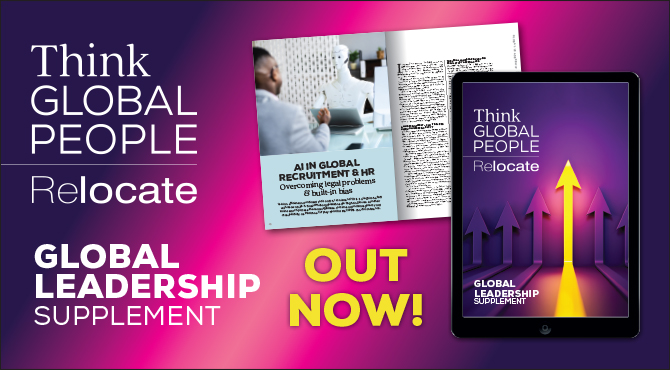AI in global recruitment and HR: overcoming legal problems and built-in bias
Is AI an efficient and unbiased tool to aid in recruitment? Or is it a legal minefield with its own built-in bias? While organisations are beginning to use AI in their talent search process, there are legitimate concerns around transparency and accountability, as Marianne Curphey heard at the CIPD’s annual conference.
This article is taken from the Leadership Supplement from
Relocate Think Global People
Click on the cover to access the digital edition.
In a panel discussion at the CIPD conference, legal and government experts took part in a robust discussion about the benefits and pitfalls of AI in recruitment. Panellists explored the global acceleration of the integration of AI in HR and recruitment processes.
Organisations are currently debating and testing three concerns: how to take full advantage of powerful AI systems; where AI is best placed to provide the most value; and how to manage its use, staying mindful of the legal and ethical dilemmas it presents.
…Read the rest of this article here on our sister website Relocate Global
Lifestyle as a key consideration
One of the most significant changes in recent years is the growing recognition that an employee’s lifestyle preferences play a crucial role in the success of a relocation. Historically, companies focused primarily on logistics – finding housing, securing work visas and finding the most suitable location.
Simon says there has been a recent shift in emphasis towards understanding what makes an employee happy outside of work, which might include providing information on amenities such as access to sports and leisure facilities.
“Lifestyle choice has become much more important,” he says. “It is about where you can go in the evenings and the weekends. Can you take your family to a nearby beach? Or, is there a mountain bike track or a climbing wall within a reasonable distance? It might seem like a secondary consideration for the employer, but it makes a big difference to the assignee. This is an area where I think it really pays off to be more proactive and understand what is important to the client.”
In relocation terms, this might mean finding an area with a slightly longer commute, but better facilities, or closer to a beach or open countryside. Looking at the relocation brief holistically can greatly improve the employee’s overall satisfaction and mental wellbeing during the relocation process.
Balancing budget constraints and rising costs
Rising rents and an increase in the cost of living mean that budgetary considerations continue to be a significant factor in relocations, especially for companies looking to send assignees away to major international cities.
Despite efforts by companies to increase relocation budgets, these often still fall short of covering all the costs employees might expect based on prior experience.“
For example, an area like Battersea in London, once considered affordable, has now become a more expensive location due to recent development and rising demand as renters are pushed out of more expensive neighbouring areas,” he says.
As a result, employees may have to adjust their expectations or consider living further out from city centres to find accommodation large enough for their needs, but that still sits within their price range.“At Icon, we play a crucial role in helping to manage these expectations and offering alternatives, ensuring that employees still find areas that match their lifestyle while staying within budget constraints,” Simon says. “By being more proactive we can move towards having a happier assignee, a more successful relocation and a better return on investment for the company.”
Icon’s technology can detect discrepancies in rental budgets compared to current rental prices. This enables Icon to identify the potential mismatch and work with the client to manage assignee expectations. The technology can also identify locations that are particularly difficult for securing properties at a particular price so Icon can discuss alternatives.
By analysing trends in housing availability, price fluctuations and employee preferences, companies can offer more personalised advice. For instance, if an area previously popular with employees no longer offers affordable housing or the desired amenities, then relocation consultants can look for alternatives and let the client know well in advance that they may need to review their original brief. Heat maps, which track popular living areas for employees, provide relocation teams with insights that can be used to provide clients with feedback in real-time.
Using technology to communicate effectively with assignees
Technological tools are rapidly reshaping the relocation experience, providing a more seamless and tailored process for younger assignees who are happy to communicate using a variety of channels. While senior staff may enjoy the personal touch, millennials are happy to use chatbots and apps.
“A chatbot integrated into a relocation app can provide critical information like whether tap water is drinkable in a new city or what local amenities are available,” Simon says. “You need to be communicating in a wide variety of ways. If somebody wants to engage first in person, then you might provide that, whereas another assignee might prefer a WhatsApp experience. You can no longer assume that a telephone call and email are satisfactory.
”Additionally, language apps are playing a crucial role in reducing relocation stress, especially for employees and their families who may not be fluent in the language of their new country. Being able to access information and ask questions in their native language helps create a more inclusive and supportive relocation experience.
These trends in employee relocation reflect a broader shift towards greater flexibility, personalisation and the use of data and technology to enhance the experience. Relocation experts like Icon are working with employers to be proactive and personalise the assignee experience at a much earlier point in the moving process.“Technology enables us to provide a more dynamic and responsive service, taking into account employee preferences while advising clients on changes in rental prices, advising on suitable locations and proposing properties in real-time,” Simon says.
In this way, technology can be a tool to help liaise on budgets, manage expectations and enhance satisfaction before, during and after the relocation process. The more tailored and proactive the relocation process is, the more successful it is likely to be and the more likely it is to deliver an effective return on investment for the company.










